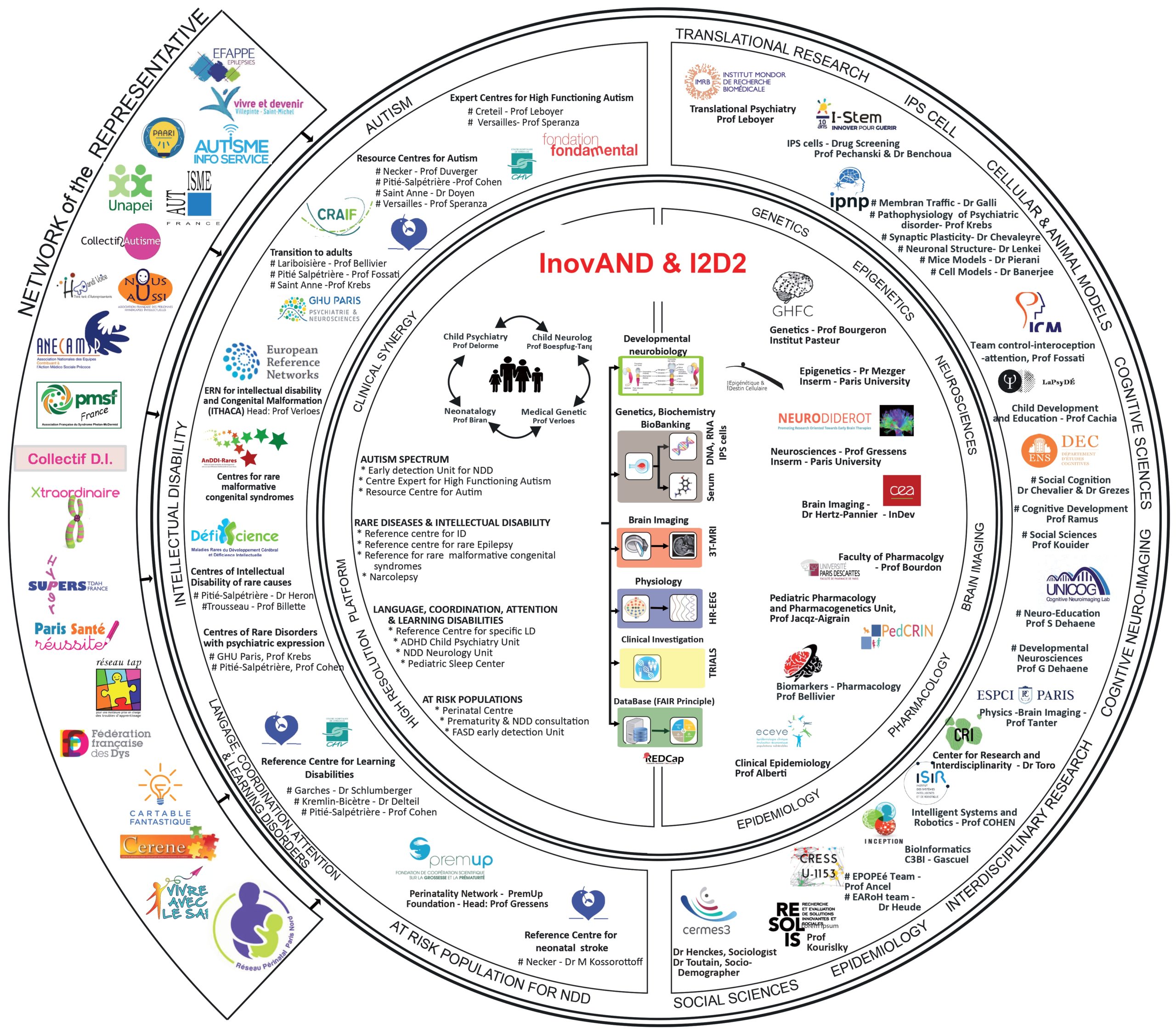
About us
NeuroDevelopmental Disorders (NDD)
Brain development is a key element of all maturation processes and is essential to ensure the integration of the child and future adult into society.
Neurodevelopmental disorders (NDDs) include a large group of brain dysfunctions relating to abnormal brain development (autism spectrum disorders -ASDs, hyperactivity and attention deficit, epilepsies, microcephalies, intellectual disability, dyslexia and other learning disorders).
Defects in brain maturation occur in 1/10 children. The annual cost of care for a child with ASD is 85-550% higher than that for a typically developing child. With an incidence of 1/100 and no cure, ASDs underlie the burden of NDDs and the urge to better understand these diseases to define innovative therapeutics.
An integrative approach to NDD

Strengths
The aim of I2-D2 is to define individual trajectories of the NDD patients to identify early, in each child, the key factor(s) responsible for the abnormal brain development, to develop predictive biomarkers, and, ultimately, individualized therapies.
Through combining several clinical departments, one key aim of I2-D2 is to offer a unique platform for early detection, diagnostic and care of a large number of infants at risk to develop a NDD or with a NDD. In addition, the close interaction between clinicians, clinical research structures, bioclinical laboratories, and translational researchers covering multiple aspects of NDDs (genetics, epigenetics, developmental neurobiology, neurosensory development, pharmacology, biomarkers, advanced imaging, and epidemiology) will promote a robust and unique continuum from bench to bedside.

Selected as part of the Strategy for Autism within Neurodevelopmental Disorders (NDDs) 2018-2022, InovAND is coordinated by Professor Richard Delorme, Head of the Child and Adolescent Psychiatry Department at Robert Debré Hospital. Its aim is to establish links between prematurity, genetic abnormalities and NDDs and to understand the genetic and epigenetic determinants of autism and more generally of NDDs.
InovAND relies on the FHU I2-D2 to promote research leading to new therapies for the developing brain. This programme also collaborates with the Institut Pasteur, the FondaMental and Neurospin foundations, the Institute of Psychiatry and Neuroscience of Paris and the Centre for research on medicine, science, health, mental health, and society (Cermes3) of the CNRS.
InovAND brings together clinical and scientific teams, family and patient associations in order to develop basic and applied research; to ensure continuity between diagnostic and therapeutic expertise; to strengthen university training on NDDs.
For more information:
InovAND: https://www.clepsy.fr/
Strategy for Autism within Neurodevelopmental Disorders (NDD) 2018-2022:
https://handicap.gouv.fr/la-strategie-nationale-autisme-et-troubles-du-neuro-developpement
University Hospital Federations (FHUs)
Context of the creation of FHUs
The University Hospital Federations (FHU) were created following the call for FHU2019 projects launched by the AP-HP, INSERM and the Universities of Ile-de-France. 21 FHU proposals have been approved for a five-year period.
The increasingly competitive international context, marked by the emergence of new health challenges, justifies a new impetus for translational and clinical research. In 2012 and 2013, 16 university hospital departments (DHU) were jointly accredited for 5 years by the AP-HP, universities and research organisations. This programme and the 16 DHUs were evaluated by the HCERES (High Council for the Evaluation of Research and Higher Education). The report was very positive and recommended that the experience be repeated. The DHUs have encouraged structured interaction for research in hospitals. The name DHU was replaced by FHU, which better describes the requirement to bring together and to federate clinical and research teams.
Objectives of the FHUs
The aim of the FHU is to support joint projects between hospitals, universities, research organisations, industry, and others, and to strengthen their collaboration on medical issues that lead to breakthrough innovations. As such, the new federations support the integration of care, teaching and research, and have a specific governance.
The creation of FHUs aims to
- Boost the university & hospital relations in order to foster collaborative projects.
- Increase the visibility and identification of priority themes in research, teaching and care,
- Diversify, target and optimise research funding.
Governance of the FHUs
The governance of each FHU is based on a management committee composed of one or more:
- Clinicians representing the DMU or DMUs constituting the FHU.
- Representatives of the academic partner.
- Researchers from the research units constituting the FHU.
The Executive Committee appoints, among its members, the FHU coordinator in charge of resource management.
Source :
http://recherche.aphp.fr/federations-hospitalo-universitaires/
For more informations :
http://recherche-innovation.aphp.fr/2019/05/29/appel-a-projets-fhu-2019/
http://recherche-innovation.aphp.fr/wp-content/blogs.dir/77/files/2019/06/Appel-doffres-FHU-2019.pdf